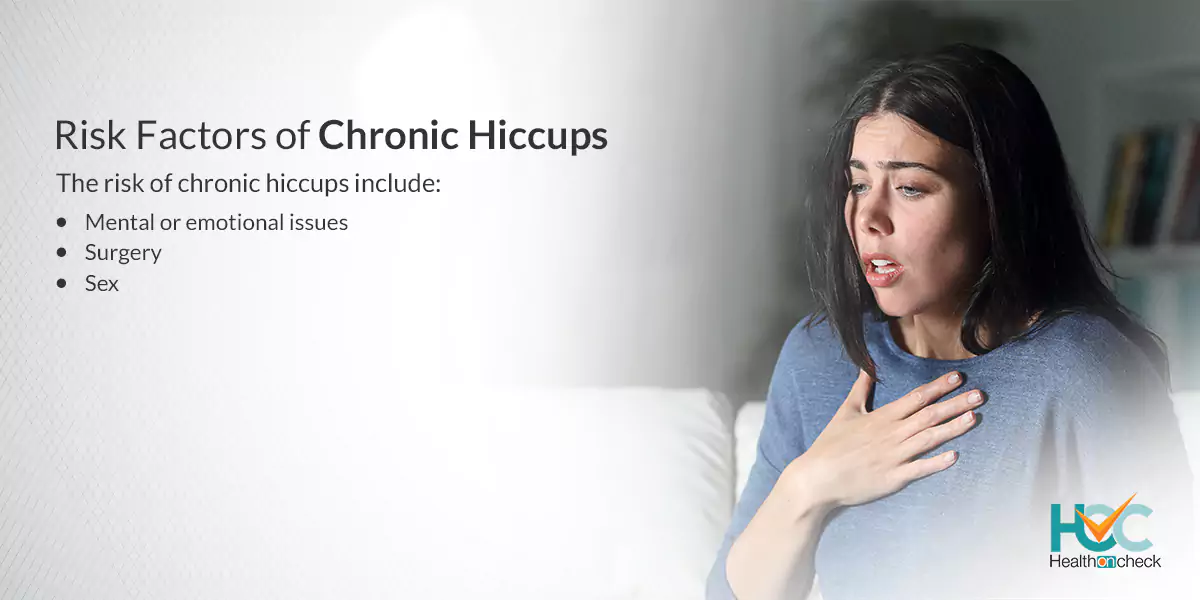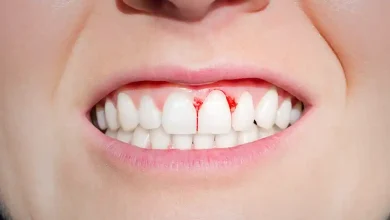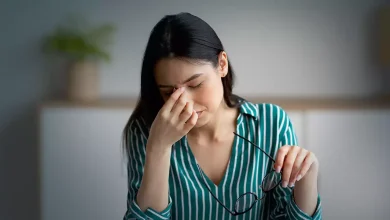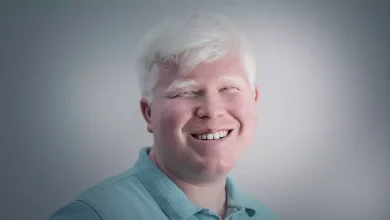What are Chronic Hiccups?

What are Chronic Hiccups?
Hiccups occur when you have repeated spasms of your diaphragm synced with a ‘hic’ sound from the closing of your vocal cords. The muscle under your ribcage, which separates your chest and stomach area is called diaphragm. This muscle is an important part of the breathing process which moves upward when you breathe out and downward when you breathe in. These actions produce the ‘hic’ sound of the hiccup. The process of the hiccup occurs quite rapidly and you’ll normally return to normal within minutes to a couple of hours. Hiccups are considered chronic when they last longer than 48 hours. They’re also termed as persistent if they last over 2 days, but end within a month. In case you have several recurring episodes of hiccups over prolonged periods then also they are considered chronic hiccups. In some people, chronic hiccups can last for years and are generally a sign of a medical issue. They can also lead to health issues themselves.
What are the Types of Chronic Hiccups?
Chronic hiccups are basically divided into two different categories. When hiccups last longer than 2 days, they’re termed as “persistent” and if they last longer than one month, they’re referred to as “intractable.”
What are the Symptoms of Chronic Hiccups?
Symptoms of chronic hiccups include spasms in your diaphragm which are uncontrolled and produce a “hic” sound. Sometimes you might experience a slight tightening sensation in your throat, chest, or stomach area.
What are the Causes of Chronic Hiccups?
There are many factors which might cause hiccups, but the exact cause of chronic hiccups isn’t always clear. It may take an extended time to discover the cause of chronic hiccups. Chronic hiccups can be stressful and exhausting and might be part of a bigger, underlying medical issue which may not go away until that issue is solved. Hiccups can also occur after a surgery and during its recovery period. Factors that might result in hiccups lasting more than 2 days usually include nerve damage or irritation, metabolic issues, central nervous system disorders and some specific drug and alcohol issues.
Some of the possible causes of chronic hiccups include:
– Abdominal surgery done recently
– General anesthesia
– Diseases of the stomach, esophagus, stomach, kidneys, liver, or intestines.
– Tumours of cancer
– Spinal cord or brain lesions
– Brainstem seizures
– Pneumonia
– Irritation of the nerves controlling the breathing
Use of certain drugs or problems with alcohol might also cause chronic hiccups.
Examples might include:
– Medicines make you feel sleepy and relaxed and sleepy, including sedatives or other medicines used for anaesthesia.
– A steroid known as dexamethasone, used for relieving inflammation in diseases like ashtma, arthritis and kidney problems.
– Other steroids.
– Alcohol abuse.
Chronic hiccups might also occur if your body’s metabolism is not functioning properly.
Examples of metabolic issues usually include:
– Diabetes.
– Electrolyte imbalance, which occurs when the levels of sodium, potassium and other electrolytes are too low or too high.
– Kidney problem.
A cause of chronic hiccups is harm to, or irritation of, the vagus nerves or phrenic nerves which supply the diaphragm muscle.
Factors that might irritate or damage these nerves include:
– A hair or something else in your ear that is touching your eardrum.
– A cyst, tumour, or growth on the thyroid gland in your neck.
– Stomach acid backing up into your oesophagus, the muscular tube that provides food from your mouth to your stomach.
– Laryngitis or sore throat.
Also, an infection or tumour in your central nervous system or any harm in your central nervous system because of an injury can hinder your body’s normal control capacity of the hiccup reflex which can result in chronic hiccups.
What are the Risk Factors of Chronic Hiccups?
The risk of chronic hiccups include:
– Sex
Males are much more prone to develop chronic hiccups than females.
– Mental or emotional issues
Stress, excitement, and anxiety can increase the risk of chronic hiccups.
– Surgery
Developing hiccups after general anaesthesia or procedures involving organs in the stomach area is common among some people.
What are the Complications of Chronic Hiccups?
Though chronic hiccups do not cause much serious complications, they can have a negative impact on your overall health. Chronic hiccups can create problems in carrying out things such as:
– Drinking and eating
– Sleeping
– Speaking
They can affect your mood also because of being uncomfortable and irritating.
Because of these things you might also experience problems including:
– Fatigue
– Difficulty in sleeping
– Weight loss
– Malnutrition
– Dehydration
– Stress
– Depression
Hiccups also make pain worse occuring because of other health complications.
How Chronic Hiccups are Diagnosed?
For diagnosing chronic hiccups, at first, your doctor will perform a neurological exam to check your:
– Coordination and balance.
– Muscle tone and strength.
– Reflexes.
– Sight and sense of touch.
If your doctor doubts an underlying medical condition that might be causing your hiccups, he/she might recommend one or more of the following tests.
– Blood test
Samples of your blood will be taken and sent to a lab to check for signs of infection, diabetes, or kidney disease.
– Imaging tests
Imaging tests help to detect problems inside your body that might be affecting your diaphragm or the nerve controlling your diaphragm, known as the phrenic nerve. These tests might show any problem with the main nerve in your nervous system, known as the vagus nerve. Imaging tests usually include a CT, a chest X-ray, or an MRI.
– Endoscopic tests
A thin, flexible tube known as an endoscope containing a tiny camera is used in these tests that are inserted in your throat and into your oesophagus, also known as your food pipe. These tests aim to detect issues in your windpipe or oesophagus.
What are the Treatment Options Available for Chronic Hiccups?
Hiccups mostly go away on their own without the need for any medical treatment. If any underlying medical problem is the cause of your hiccups, treating that condition might cure the hiccups.
If your hiccups last longer than 48 hours then medicines or specific procedures might be required.
– Medicines
Medicines used to treat chronic hiccups include chlorpromazine, baclofen, and metoclopramide.
– Procedures
If taking medicines orally is not effective, your doctor might prescribe an injection of an anaesthetic to block your phrenic nerve and stop hiccups.
Surgically implanting a battery-operated device to deliver mild electrical stimulation to your vagus nerve is another option that is most commonly used to treat epilepsy, but it is also helpful in controlling chronic hiccups.
– Lifestyle and home remedies
There’s specific treatment available to stop hiccups but in case your hiccups last more than a few minutes, then there are a few home remedies that might provide relief, even though they are not proven:
– Breathe into a paper bag.
– Gargle with ice water.
– Holding your breath.
– Drinking cold water.
If you have recurring hiccups, lifestyle changes might help which include:
– Avoiding carbonated beverages and foods that cause gas.
– Having smaller meals.
When chronic hiccups are not responding to other remedies, alternative treatments, like acupuncture and hypnosis, might help.
Living with Chronic Hiccups
While one-time or occasional hiccups are normal and get well by themselves quickly, chronic hiccups are quite rare and are more difficult to treat. If you have hiccups that last more than 48 hours or have multiple hiccup episodes occurring more regularly over time, then you should consult with your doctor because they might be a symptom of a more serious medical condition.
Whom to Consult?
You should seek immediate medical assistance if your hiccups last more than 2 days or if they’re so severe and create problems with breathing, sleeping, or eating. Chronic hiccups can affect your quality of life along with your health if proper treatment is not given.





